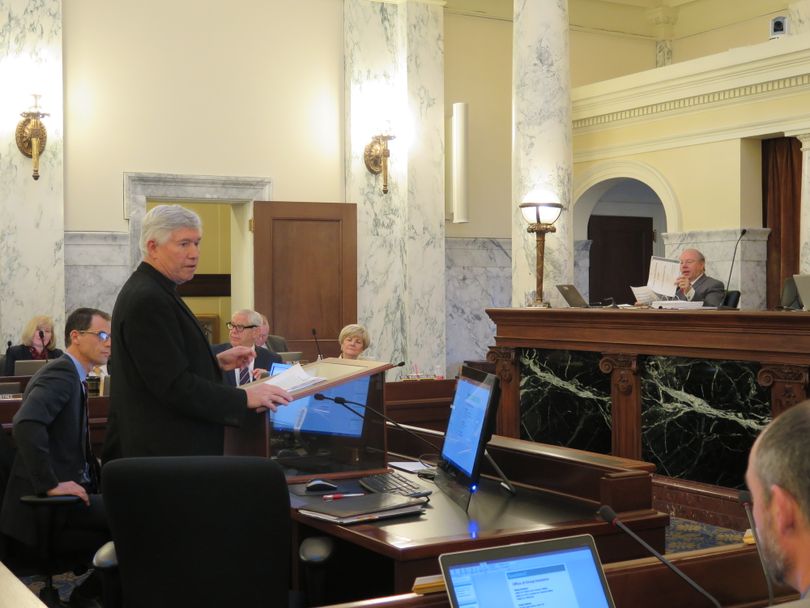Lawmakers mulling ambitious plan to address Idaho’s doctor shortage

Idaho is severely lacking in doctors, and many of its existing ones are nearing retirement age, Dr. Ted Epperly told the Legislature’s Joint Finance-Appropriations Committee this morning, as he presented the state’s new 10-year plan to increase graduate medical education in the state, which the state Board of Education is recommending launching in the coming year.
“We’re 49th out of 50,” Epperly said, both in the number of doctors per-capita and in the number of medical residents per capita. “This plays out in terms of not having ready access to care, especially in rural and frontier areas across our state.”
The 10-year plan would sharply expand medical residency training in Idaho, producing 2,000 new physicians for Idaho over the next decade. Without it, under the existing system, just 520 would be trained over that time. The proposal is for a public-private partnership, with the state paying a third of the cost.
“We have a hole in Idaho, a hole that’s important for us to start to fill now, because this problem will not go away,” Epperly warned. “And primarily it’s not going away because 27 percent of our active physician workforce is over the age of 60.” He added to chuckles, “I resemble that remark.”
Epperly was brought on by the state Board of Education to develop the 10-year plan, after Gov. Butch Otter charged the state board to work with the medical community and Idaho’s higher-education institutions to come up with a new plan to address the future demand for health care providers in Idaho; the board convened a broad group of stakeholders. An Idaho native and a graduate of the WWAMI medical education program, Epperly is one of the nation’s foremost experts in graduate medical education.
The plan will add new graduate medical training programs in Idaho at locations all around the state, in an effort to create the equivalent of a “sprinkler system,” Epperly said, spreading the training to all regions of Idaho. That’s because 50 to 75 percent of medical residents stay in the location where they do their residency.
Idaho has 6.7 medical residents per 100,000 people; the U.S. average is 28.1. And 27 percent of Idaho’s physicians are over age 60 and will reach retirement age in the next 10 years.
Idaho now has nine residency programs around the state; under the new plan, it will go up to 21 in all geographic regions of the state. It would increase the number of residents and fellows training in Idaho from 141 to 356, and raise Idaho’s per capita number of medical residents from 6.7 per 100,000 to 17.7, which still would be far below the national average. The cost to the state next year is $5.2 million, with smaller increases in each of the next nine years.
The governor's budget proposal doesn't include full funding for the plan, funding only a portion of the proposed upgrades next year, but the state Board of Education unanimously endorsed the plan in December.
“This plan provides a once in a generation opportunity that will start to serve multiple generations in Idaho, for generations to come,” Epperly told JFAC. “We’ve got a lot of work in Idaho to do, but we’re in this together to do it.”
Under the plan, Idaho would rise from 49th in the nation to 41st.
“It’s an exciting opportunity we have here in a state that needs it,” Epperly said. “It’s an exciting opportunity for Idaho, and that’s why we’re all, that have had a hand in this, we’re all proud of it.”
Lawmakers had several questions about the plan; one was about the inclusion of psychiatry in the new residency programs. That brought this news: Idaho ranks 50th - last among the states - in its number of psychiatrists per capita. “Every single county in Idaho is a mental health profession shortage area, every single county, including Ada,” Epperly said. “So we are well behind the 8-ball.”
This 10-year plan, he said, "will start to populate that team."
“Thank you so much,” JFAC Co-Chair Rep. Maxine Bell told Epperly. “We look forward to working with you.”
Note: This post has been clarified to reflect that while Gov. Butch Otter initiated the process that led to this plan, he is not fully supporting it in his budget recommendation for next year. I'm getting more information and will have a full story later today.
